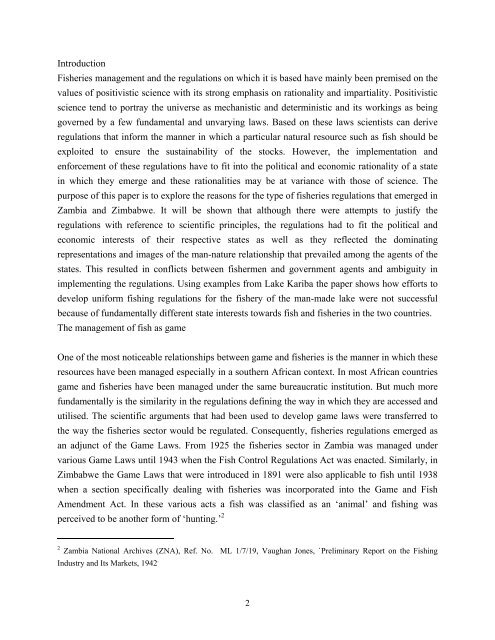The emergence of fisheries legislation and regulations in Zambia ...
The emergence of fisheries legislation and regulations in Zambia ...
The emergence of fisheries legislation and regulations in Zambia ...
Create successful ePaper yourself
Turn your PDF publications into a flip-book with our unique Google optimized e-Paper software.
Introduction<br />
Fisheries management <strong>and</strong> the <strong>regulations</strong> on which it is based have ma<strong>in</strong>ly been premised on the<br />
values <strong>of</strong> positivistic science with its strong emphasis on rationality <strong>and</strong> impartiality. Positivistic<br />
science tend to portray the universe as mechanistic <strong>and</strong> determ<strong>in</strong>istic <strong>and</strong> its work<strong>in</strong>gs as be<strong>in</strong>g<br />
governed by a few fundamental <strong>and</strong> unvary<strong>in</strong>g laws. Based on these laws scientists can derive<br />
<strong>regulations</strong> that <strong>in</strong>form the manner <strong>in</strong> which a particular natural resource such as fish should be<br />
exploited to ensure the susta<strong>in</strong>ability <strong>of</strong> the stocks. However, the implementation <strong>and</strong><br />
enforcement <strong>of</strong> these <strong>regulations</strong> have to fit <strong>in</strong>to the political <strong>and</strong> economic rationality <strong>of</strong> a state<br />
<strong>in</strong> which they emerge <strong>and</strong> these rationalities may be at variance with those <strong>of</strong> science. <strong>The</strong><br />
purpose <strong>of</strong> this paper is to explore the reasons for the type <strong>of</strong> <strong>fisheries</strong> <strong>regulations</strong> that emerged <strong>in</strong><br />
<strong>Zambia</strong> <strong>and</strong> Zimbabwe. It will be shown that although there were attempts to justify the<br />
<strong>regulations</strong> with reference to scientific pr<strong>in</strong>ciples, the <strong>regulations</strong> had to fit the political <strong>and</strong><br />
economic <strong>in</strong>terests <strong>of</strong> their respective states as well as they reflected the dom<strong>in</strong>at<strong>in</strong>g<br />
representations <strong>and</strong> images <strong>of</strong> the man-nature relationship that prevailed among the agents <strong>of</strong> the<br />
states. This resulted <strong>in</strong> conflicts between fishermen <strong>and</strong> government agents <strong>and</strong> ambiguity <strong>in</strong><br />
implement<strong>in</strong>g the <strong>regulations</strong>. Us<strong>in</strong>g examples from Lake Kariba the paper shows how efforts to<br />
develop uniform fish<strong>in</strong>g <strong>regulations</strong> for the fishery <strong>of</strong> the man-made lake were not successful<br />
because <strong>of</strong> fundamentally different state <strong>in</strong>terests towards fish <strong>and</strong> <strong>fisheries</strong> <strong>in</strong> the two countries.<br />
<strong>The</strong> management <strong>of</strong> fish as game<br />
One <strong>of</strong> the most noticeable relationships between game <strong>and</strong> <strong>fisheries</strong> is the manner <strong>in</strong> which these<br />
resources have been managed especially <strong>in</strong> a southern African context. In most African countries<br />
game <strong>and</strong> <strong>fisheries</strong> have been managed under the same bureaucratic <strong>in</strong>stitution. But much more<br />
fundamentally is the similarity <strong>in</strong> the <strong>regulations</strong> def<strong>in</strong><strong>in</strong>g the way <strong>in</strong> which they are accessed <strong>and</strong><br />
utilised. <strong>The</strong> scientific arguments that had been used to develop game laws were transferred to<br />
the way the <strong>fisheries</strong> sector would be regulated. Consequently, <strong>fisheries</strong> <strong>regulations</strong> emerged as<br />
an adjunct <strong>of</strong> the Game Laws. From 1925 the <strong>fisheries</strong> sector <strong>in</strong> <strong>Zambia</strong> was managed under<br />
various Game Laws until 1943 when the Fish Control Regulations Act was enacted. Similarly, <strong>in</strong><br />
Zimbabwe the Game Laws that were <strong>in</strong>troduced <strong>in</strong> 1891 were also applicable to fish until 1938<br />
when a section specifically deal<strong>in</strong>g with <strong>fisheries</strong> was <strong>in</strong>corporated <strong>in</strong>to the Game <strong>and</strong> Fish<br />
Amendment Act. In these various acts a fish was classified as an ‘animal’ <strong>and</strong> fish<strong>in</strong>g was<br />
perceived to be another form <strong>of</strong> ‘hunt<strong>in</strong>g.’ 2<br />
2 <strong>Zambia</strong> National Archives (ZNA), Ref. No. ML 1/7/19, Vaughan Jones, `Prelim<strong>in</strong>ary Report on the Fish<strong>in</strong>g<br />
Industry <strong>and</strong> Its Markets, 1942 .<br />
2

















